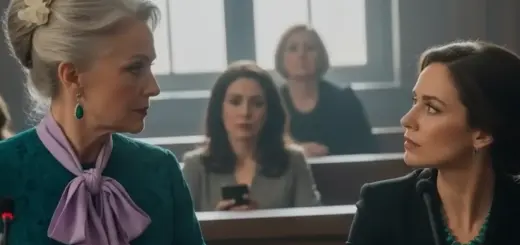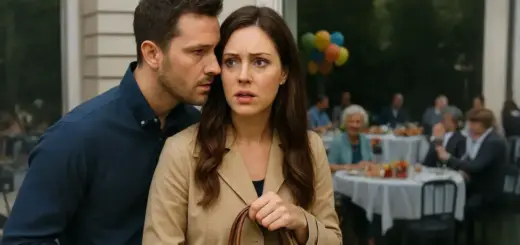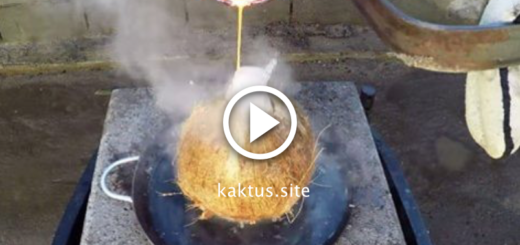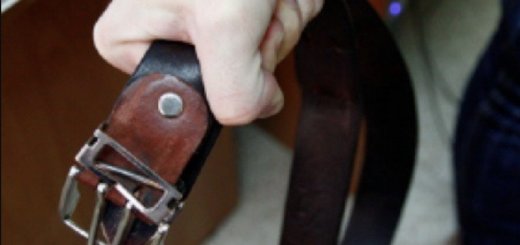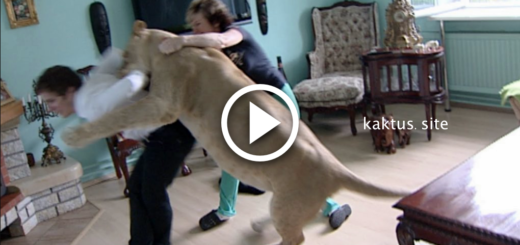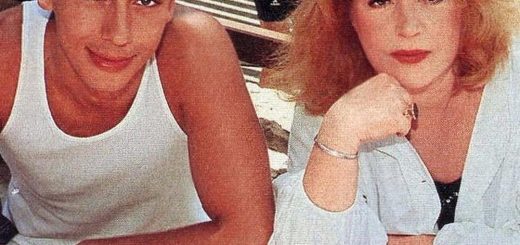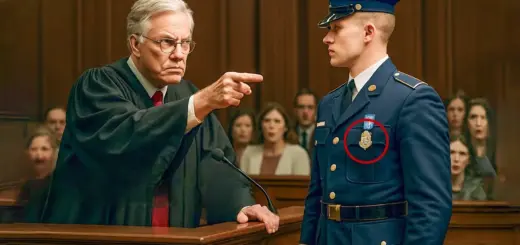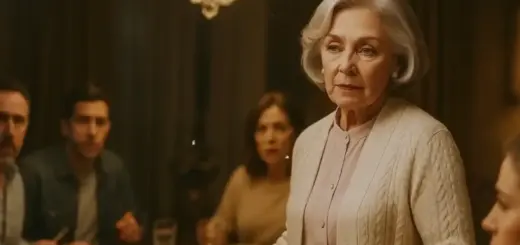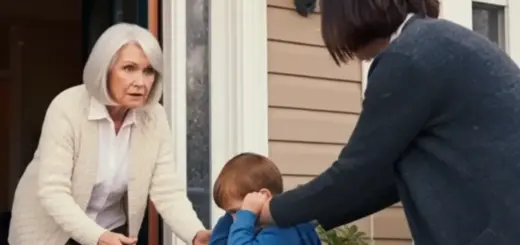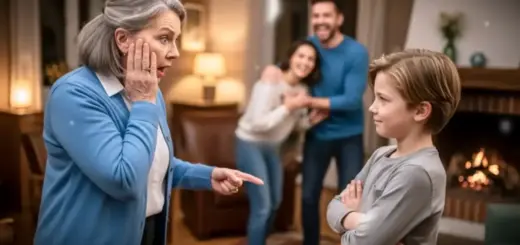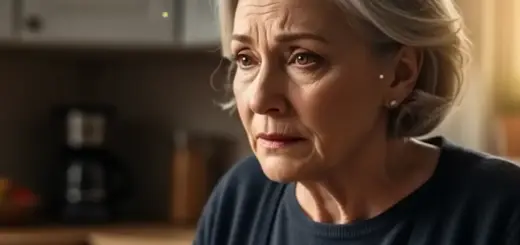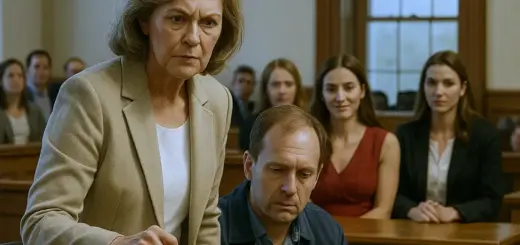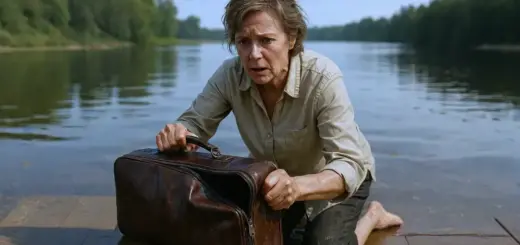It wasn’t awkward or tense. It was final. A door closing.
Then, without another word, they turned and walked away, their retreating figures a portrait of defeat. I closed the door gently, the soft click of the latch echoing in the sudden stillness of my home. I had told them I wouldn’t be erased. Now I had to show them what that meant.
I decided to go to their house the next afternoon. I wasn’t going to argue or to plead. I was simply going to be clear.
I brought the folder with me again, tucked under my arm like an old familiar friend. Iris opened the door, a stiff, brittle smile plastered on her face that didn’t come close to reaching her eyes. Caden was already in the living room, sitting on the edge of the sofa, his hands clasped tightly between his knees.
No one offered me a cup of tea this time. I placed the documents on the coffee table between us, a quiet offering of truth. «These are not threats,» I said, my voice low and steady.
«They are records. I’m not here to ask for anything. I just want to make sure you understand what has already been agreed to.»
Caden began to flip through the pages, his movements slower this time, as if he were trying to absorb the weight of each transaction. Iris remained standing by the doorway, her arms crossed, a silent, defiant statue. «So, you want to be the hero now?» she asked, her voice sharp with sarcasm.
«Is that it? You want us to bow down and thank you?»
«No,» I replied, meeting her gaze without wavering. «I want to close the account.»
She let out a short, harsh laugh. «You’re not a hero.»
«You’re just a bitter old woman who needs to feel important.» My voice remained even, devoid of the anger that was churning inside me. «I was the accountant,» I said simply.
«And now, the account is closed.» Caden looked up from the papers, his face a mixture of confusion and dawning understanding. «What does that mean?» he asked.
«It means,» I said, letting my words sink in, «that whatever you build from this day forward, however you manage to keep the boutique open or don’t, is entirely yours to carry. I will not fund it, I will not fix it, and I will not answer for it anymore.»
No one tried to stop me as I stood up. I picked up my original folder, leaving the copies on their coffee table, a silent testament to the past, and walked out the door. The silence that followed me was heavier this time, freighted with the weight of unspoken truths and the consequences of choices made long ago.
Two mornings later, a thick, official-looking envelope arrived through my mail slot. I knew what it was before I even opened it. The legal jargon was dense, but the message was clear: coercion, undue influence, a claim that I had manipulated a vulnerable Iris into signing the ownership contract while she was under extreme financial and emotional distress.
They were demanding that I return the shares, that my name be wiped clean from their business, that I simply disappear. That evening, I called my friend Blythe. She listened to the whole story without interruption, and when I was finished, she gave me a name: Margot Delaney.
«A retired litigator,» Blythe had said, «but still as sharp as a tack.» Margot was all of that and more. She read the contract, reviewed the bank statements, and even unearthed old email threads between me and the boutique’s landlord and suppliers.
When she was done, she gave a single, decisive nod, the kind that spoke of a confidence born from years of experience. «This is a bluff,» she said, her voice crisp and no-nonsense. «We’ll end this cleanly,» and we did.
The court hearing was over in less than twenty minutes. Their lawyer made a passionate, if unsubstantiated, argument. Margot, in her calm, methodical way, presented the facts: the dates, the figures, the signed forms, the time stamps on the wire transfers, the ownership agreement that had saved their business from certain collapse.
The judge, a woman with kind, tired eyes and a mane of silver hair, looked over the mountain of evidence, then looked directly at Iris. «The evidence presented is unshakable,» she said, her voice leaving no room for argument. «The motion to dismiss is granted.»
The sharp crack of the gavel seemed to make Iris flinch. She left the courtroom on Caden’s arm, her face pale, her steps unsteady. Neither of them looked at me.
Outside, in the bright California sun, Margot turned to me with that same reassuring nod. «It’s over,» she said simply. «They can’t touch your shares again.»
I nodded, a wave of exhaustion washing over me. I didn’t feel victorious. There was no triumph, no sense of vindication, just a profound, bone-deep weariness, the kind that comes only after years of silence finally give way to the truth.
The quiet that followed wasn’t the heavy, expectant silence of the days after the dinner. It was a different kind of quiet, one that crept in slowly, like morning fog, and settled over my life. The text messages from Caden, once a steady stream of requests and reminders, dwindled to nothing.
The phone calls from Iris, always a prelude to a new financial crisis, ceased altogether. At first, I thought the silence would be painful, a constant reminder of the family I had lost. But instead, it felt like space, like a room that had been cluttered for years had finally been cleared out, leaving room to breathe.
Without the steady infusion of my funds, the polished veneer of the boutique began to chip and fade. I heard through the grapevine, a friend of Blythe’s who knew someone who worked nearby, that Iris had been forced to downsize her inventory and let two of her employees go. There were whispers of late rent payments and suppliers who were now demanding cash up front.
I felt no satisfaction in their struggles, no sense of vengeful glee. I didn’t hope for their failure, but I also didn’t ride to the rescue. My days as their safety net were over.
I had spent so much of my life being useful to them that I had forgotten what it felt like to be still. To simply be. My mornings, once consumed with their problems, now began with the feel of cool earth under my fingernails and the soft rustling sound of leaves in the early morning sun.
I learned how to divide dahlia bulbs and harvested rosemary from my garden, which I gave to my neighbor Pauline, who baked it into the most delicious bread for her little cafe. I started painting again. My first few canvases were a disaster, but slowly, tentatively, I began to find my way.
I would lose hours in the simple act of mixing colors, of trying to capture the light as it fell across a vase of flowers. It was a kind of freedom I hadn’t experienced in decades. I started volunteering at a local financial literacy clinic.
I helped people who had never balanced a checkbook, widows who were struggling to navigate the confusing world of online bill pay, and college students who were trying to build good credit from the start. No one there ever sneered at my advice or questioned my usefulness. It was a strange and wonderful feeling to be so deeply seen, so appreciated, by people who asked for nothing more than what I was willing to give.
Then, one evening, my phone buzzed with a message. It was from Caden. «Mom, we miss you.»
Just those four words. No punctuation. No explanation.
I read it once, then again. It didn’t say, «I’m sorry.» It didn’t say, «I understand now.»
It just said, «we miss you.» As if my absence was the only thing that had gone wrong. As if the distance between us was the cause of the crack in our family, and not the years of dismissal and disrespect that had preceded it.
I didn’t reply. I didn’t type out a dozen angry responses only to delete them. I didn’t sit with the familiar ache in my chest, hoping it would fade.
I simply deleted the message and turned my phone face down on the table. The kettle was whistling on the stove, signaling that the water was ready for my evening tea. A half-finished canvas, a riot of blues and greens, waited for me in the sunroom.
The garden hose was still coiled by the peonies, whose petals were just beginning to curl at the edges, a sure sign they were thirsty. So I filled my watering can and stepped back out into the cool evening air. The life they had tried to confine me to, the small, useless life they had defined for me, was never really mine.
This one, this quiet, simple, beautiful life was. And it was blooming, finally, without anyone’s permission but my own.

